#Encanto meta
Text
Mother and son shaped by trauma: a deeper look into Alma and Bruno's damaged relationship
Alma and Bruno's mother-son relationship seems like such a minor aspect of the movie, but when you give it some thought, despite the limited focus, it's not only a very complex relationship, but also a narratively significant one.
Obviously we don't have a lot of information on it, but let me reflect a bit on the things we do know, while trying to fill in some blanks. Long post ahead.
Back to the start - how did it go so wrong?
There's one particularly interesting detail that Jared Bush shared on a podcast some time ago. It mostly comes down to the reason Bruno's visions were usually so negative: because that's how he was taught to use his gift by his mother, who would ask him to look into the future for any possible dangers to their home.
Now, this makes perfect sense for Alma's character and gives a great insight into how her trauma affected her. It's a completely natural consequence of the tragedy she experienced - of course she would be gripped by fear and desperate to protect her home from another tragedy at all cost. And the power of foresight is seemingly the ultimate key to preventing tragedy, so of course she would rely on her child's gift for that...
...and yes, that's a great burden to put on your child's shoulders and something that clearly had troubling consequences. The particularly frustrating thing being that those consequences could have been largely prevented only if Bruno had proper understanding and emotional support.
The thing is...the understanding and support probably were there for some time. Some bonus materials suggest that Bruno was not always the black sheep of the family, but quite the opposite. He was apparently once the golden child of the family - until people began to believe his gift was actually responsible for bad future events.
Which brings me to the important question: why did it go so wrong? If Alma herself believed Bruno's gift could help prevent disaster, how and why did this belief that it's actually causing disaster came to be? Didn't she try to protect her son from his gift being horribly misunderstood?
Well, I'd like to give Alma the benefit of the doubt that she did try to protect him, at least when he was a child. But I do wonder if she simply grew exhausted by Bruno at some point, as he grew older? Exhausted by his unclear visions, which were hard to control and not that helpful after all (I think Dolores' verse in WDTAB kinda suggests it). Exhausted by Bruno's eccentric personality that was so far away from the "perfect image" she wanted for the family. And maybe that frustration led to her ultimately neglecting him emotionally and enabling the negative attitude to his gift, even if it wasn't intentional on her part.
Broken trust
Again, this is all just my interpretation and I don't want to assume the worst without any proof... however, I do think it's reasonable to believe that Alma did fail Bruno in some way.
And she might have not realized it, but I think Bruno himself very much felt she failed him. That would also explain his evident lack of trust in her. I talked in one of my previous posts how Bruno not trusting Alma with the vision about Mirabel is a big red flag that something was very wrong in the family. Ideally, he should have been able to trust his mother with the vision, but we were as far from the ideal scenario as we could be - Bruno choosing to hide the vision is a clear sign how damaged his relationship with his mother was at this point and how broken his trust in her was.
Ironically, if Bruno's decision was a result of broken trust in his mother...the same decision also broke her trust in him.
Let's look at it from her (sympathetic but misguided) perspective for a moment. Bruno's gift was something she had relied on in order to protect her family. And so many years later, no matter what the present attitude to his gift was, she still went to him in a difficult moment. So the fact that he essentially denied her that help would definitely feel like a huge betrayal - for Alma it probably looked like Bruno had betrayed the family and betrayed the miracle.
Those would be the understandable feelings of a traumatized woman who probably couldn't stand losing someone she loves yet again - believing Bruno betrayed and abandoned them because he doesn't care was likely a kind of coping mechanism to numb the grief.
Regardless of how understandable those feelings might be though, this coping mechanism was deeply unhealthy and harmful. What's more, the choice to paint Bruno as the bad guy shows horrible lack of self-awareness. And that lack of self-awareness only intensified the unhealthy environment in the family.
Because in the end, Bruno leaving the family should have been the wake-up call that the "perfect" family might have some issues to work through and something needs to change to avoid driving away anyone else. Alma might have not known Bruno's motives to leave, might have been understandably angry and hurt about him hiding the vision, but she definitely should have reflected on her own mistakes as a mother that led to Bruno making this decision.
Protecting the family and understanding the true miracle
But beyond how trauma shaped their relationship, I think there's something else at the core of the issue: their love for their family and their different understanding of what it means to protect it.
I talked about how Alma went to Bruno in a difficult moment, when she feared for the future of the miracle - and that the fact he never gave her the vision and simply ran away must have felt like a betrayal to the miracle.
In some way Bruno did betray the miracle - he betrayed the miracle in the way Alma understood the miracle at that point, as a source of magic more than anything else. And ironically, by doing so, Bruno showed that he actually understood what the miracle was truly about.
Alma was so fixated on protecting the miracle that she ended up losing sight of what was truly important and hurt the family. On the other hand, Bruno saw a threat to the miracle and yet still chose protecting his young niece's well being over anything else - one "giftless" little girl mattered more than the magic.
My point here isn't "Alma bad, Bruno good", that's a huge simplification. Both of those characters were very damaged and were going to unhealthy extremes to protect what was important to them. I'm not saying Bruno's decision to hide the vision was the "right" one or something to be glorified - I mostly think that it's a decision that should have never been made and again, the fact he felt he had to do that shows the deep rooted issues within the family.
But ultimately, he did have the right priority there - of course Mirabel's well being matters more than the magic. Every member of the family matters more than the magic. That's the whole point of the movie and the core of Alma's character arc - realizing that the family itself is the greatest gift.
And one detail I particularly like is that Alma and Bruno are the two people to tell Mirabel she's the real miracle in the end - it shows their values are finally on the same page and there's finally hope for mutual understanding between them.
#Encanto#encanto meta#bruno madrigal#alma madrigal#my meta#long post#bear with me writing long encanto meta again#a lot of this has probably been discussed before
83 notes
·
View notes
Photo

From page 162 of the artbook.
The family & house are tied together. If the family has problems so does the house.
Cracks
- Visual representation of family problems.
- A “symptom” of the family’s dysfunction
And like the family, Casita internalizes these problems, presenting a perfect facade while she crumbles apart. We only see the extent of the damage when Mirabel enters the walls. But before we see the spackle, there’s something else broken inside their home:

The walls visibly bow away from the rift in the floor, split open. In a magical house, what else could it be, except the largest of the cracks? And what is the biggest break in the family, an actual rift?

It’s too large to patch. Bruno cannot mend it from inside the walls, cannot even try. And after the family sees Bruno’s last prophecy, while Alma is furious and much of the family is scapegoating Mirabel, Mirabel almost falls into that same crack. But when she calls for help, Bruno reaches out. And Mirabel hauls them both out of the hole in the walls.
#encanto#casita#bruno madrigal#mirabel madrigal#encanto meta#yes ch 1 of As they learn to see was designed around this metaphor#that timing wasn't coincidental :)
245 notes
·
View notes
Note
i know you are in your Wish Criticism and Analysis Era (love to see it, very interesting takes!!), but i was wondering if you could spare some thought as to why you thought that the moral/lesson of Encanto was not great? in my eyes, it was always mostly about forgiving and moving past generational trauma... even if the movie didn't fully execute on that hah
I can try! I haven't gone over it in my brain in a while. Sometimes answering questions helps me verbally do it, though.
I guess I should clarify. The message in Encanto isn't outright evil...it's just a little tricky to try and teach in the story that they used, without also saying a bunch of stuff that is problematic. I'll try to explain.
The main point in Encanto seems to be something like: "You don't have to be perfect: just being yourself is special enough."
Easy enough. When anyone in the Madrigal family tries to meet Abuela's super-high standards, it turns out to be hurtful. The more Pepita holds her emotions in, the more tense and stressed she gets. The more Luisa tries to carry, the more tense and stressed she gets.
But the problem is, the movie so often gets TOO CLOSE to portraying the opposite of "just being yourself is special enough" as "give your life for others." It tiptoes too close toward the "self-focus is beneficial" line.
The Madrigal family occupation, the thing Abuela is pushing them all too hard to do, is not something bad. She wants them to use their gifts to help others. But Abuela is a (sympathetic) antagonist in the movie.
And it's explained. You feel for her. She apologizes and there's forgiveness, like you said--I'm just saying, it's tiptoeing up to a line that isn't always the most responsible line to show to kids, in a kids' movie. Kids do not generally need help questioning whether or not their parents are being too controlling, or too pushy, or wanting too much--kids usually already lean too far in that direction on their own.
But like. The problem is, there's an equal-opposite lesson each of the character could learn that I think is better for kids, when they're kids.
Pepita should be free to feel, genuinely --> yeah, but Pepita also shouldn't let her emotions get so out of control that they hurt others.
Luisa shouldn't be expected to carry every family burden --> No, but in general it's a good thing to "bear one another's burdens in love" and do whatever you can to help, even if it's heavy.
Isabella shouldn't have to act happy & pretty constantly, and marry for the good of others --> Of course not, but it is good to be able to find joy and act genuinely joyful in all circumstances.
Mirabel shouldn't have to have the same level of accomplishments and abilities as everyone else in order to feel loved --> No, she shouldn't at all, but also, it is never a good idea to say to yourself "there's no room for improvement in me because I'm already enough and perfect; no flaws that need apologizing for or changing."
Abuela shouldn't focus so much on controlling what her family does even if it's for their own good --> No, absolutely not, but in general, an older woman who guides and teaches her family on how to selflessly serve others is considered wise, not controlling.
Bruno shouldn't have to only tell people what they want to hear to be accepted --> no, obviously not, but he shouldn't be so constantly negative that he's causing everyone around him to be anxious (I know that simplifying it because he had a literal power to explain the future and they asked him to, but I'm talking about the lessons kids could glean.)
And that's my main beef (it's not even that big a beef; I thought Encanto was so well-done.) My main beef is that it's a movie kids will be influenced by, but the themes and lessons are really more helpful for an audience of college or even high-school-aged people. People who are old enough to have that level of discernment to say:
"Yeah, it's good that Abuela is trying to teach her family to be selfless and safe, but she goes too far by being fearful and controlling; yeah, it's good to control your emotions, but not if you go so far that you're not allowed to be vulnerable at all; yeah, it's good to want to help others by lending your strength to share their loads, but not if you go so far that you get your sense of worth from your success; yeah, it's good to stay positive and be a light to others, but not if you go too far and become a faker; yeah, it's good to be able to recognize your flaws, but not if you get your sense of worth from making up for them."
Those are the sort of sub-lessons Encanto teaches: "don't make decisions based out of fear (fear that you're losing your worth, your identity, your loved ones, your future, the love of others.)"
I'm just saying, kids aren't going to be able to pick those sub-lessons out as easily.
What will probably stick with them is the idea of grandmother = wrong; spending your life helping others = stressed and losing your superpowers etc.
But ultimately, it's a movie with a lot of heart, and this idea of grace and unconditional love, so it is not a big mistake or a loss or anywhere near what I'd rank Turning Red and Wish. It's just a little...reckless for a kid's movie. 🤷♀️
#Hope that helps#I could be wrong#there's definitely something to be said for parents explaining these things to kids thanks to Encanto#but that assumes that every parent is teaching their kids how to think critically instead of simplistically while they're being entertained#anywho#Encanto#storytelling#asked#answered#Encanto meta
24 notes
·
View notes
Text
Sometimes I remember how since Mirabel holds the miracle in herself now, it will probably be a tradition for every new Madrigal to walk with her towards their door during the ceremony, like Antonio did, and I become kind of unwell in a good way
8 notes
·
View notes
Text
Shower Thoughts
Bruno's Stone Hand: Your Future Awaits
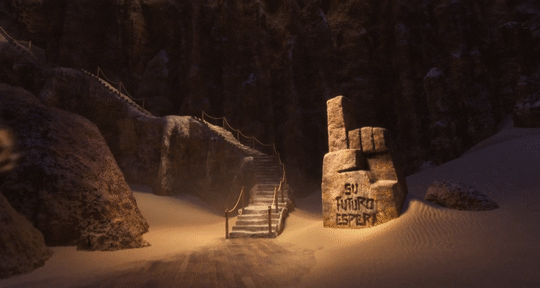
I've been thinking about this statue and trying to get into Bruno's head in case he decided to put it up, and it didn't just appear as a result of Casita's magical rooms. What was the motivation behind it? How long has it been there? And most importantly, what does it mean?
Meaning 1: "Climb all those stairs to get a vision from me."
The most on-the-nose interpretation is that this was simply meant to be a signpost to his Vision Cave for the villagers or other visitors. I can imagine it was set up when there were already a decent number of stairs in Bruno's room. At least, it would make the most sense at that point in time.

Meaning 2: "The way to Heaven/God in Christianity."
So, I saw some gravestones with a similar engraving: a hand with its forefinger pointing up to indicate the deceased's soul has risen to Heaven.

This was a prevalent symbol in the Victorian era (1837 - 1901). Of course, this concept doesn't have to apply to 19XX's Colombia, but it's an interesting thought, especially when one considers the heavy Catholic themes in Encanto and, perhaps, that Bruno might be a little old-fashioned/traditional in one way or another.
Also, most references of these headstone images I found feature the right hand as the "correct" hand for this symbol, regardless of if it's shown from the front or back. Bruno's possible left-handedness shown throughout the movie and his rock statue subverts this theme. He is different, and he is "wrong" in the eyes of the villagers.
Meaning 3: "Now listen up, the Prophet is speaking."
Bruno's expressive hand gestures often come into play when he tries to share his thoughts with other characters (Mirabel and Alma, for example.) I imagine their intention has changed from "Please, listen to me." to "May I just… please… say some–– Okay, never mind." over the course of his life.
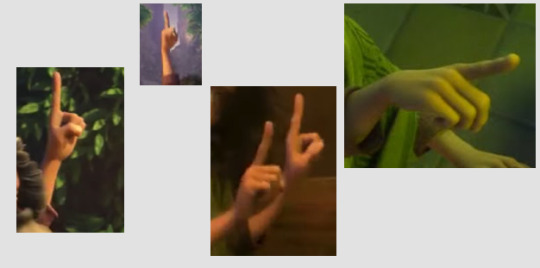
#encanto#encanto meta#encanto analysis#shower thoughts#my meta#bruno madrigal#encanto bruno#la familia madrigal#madrigal family#mirabel madrigal#alma madrigal#bruno's room#encanto details
236 notes
·
View notes
Text
so I finally watched Encanto. cue Madrigal feels bc what am I, if not on brand.
also please note, I’m a white, Slavic girl living in Central Europe so I probably didn’t get a lot of the Latinx subtext in the movie.
man, first of all, all of the Bruno feels.
Bruno must have had it so hard all his life. the only man in the family, he must have felt the pressure of supporting everyone. and the triplets presumably received their gifts at the same time and it must’ve been scary for each of them in different ways. Pepa obviously, because how do you ask a five-year-old to control their moods because a tantrum can cause a hurricane? Julieta is a different case because cooking is not an obvious gift, so maybe for a while she thought that her siblings got gifts but she didn’t?
and Bruno got future vision. at age 5. it must have been terrifying. no wonder he’s one bundle of anxiety.
I was wondering why Pepa and Julieta were rather late mothers, but now that I think of it, they must have been scared that their kids would get gifts as well. and these gifts would be just as scary.
Dolores and Isabela are both 21 which means Pepa and Julieta were both 29 when they had them. and man, while Isabella’s gift is innocent enough, Dolores’s is also kinda terrifying because imagine hearing all sorts of stuff at age 5. no wonder Julieta had her second child two years later (Luisa is 19) but Pepa waited 6 years (Camilo is 15) and then another 10 (Antonio is 5).
because Camilo’s gift is also kinda scary. Julieta’s daughters got off easy. Prow’s children? not so much.
and then Mirabel got no gift at all. and she saw it as a bad thing, as did Alma, but you can’t tell me the triplets weren’t secretly a little grateful. Pepa and Bruno at least.
Antonio’s gift is scary too, when you think about it. I bet he is gonna convince everyone to become vegan, isn’t he?
but back to Bruno.
Alma’s trauma response was the expectation of perfection from her family. but man, what expectations she must have had from Bruno, who could never replace her Pedro but who must have felt like he should. like he should be the man of the family. on top of his scary visions. I kinda think his invention of Hernando and Jorge was a little bit trying to find a version of himself that was good enough for everyone when he felt he wasn’t.
think about how everyone thinks Bruno was mischievous, when in reality he was a nervous goofball.
his disappearance… one doesn’t make such a decision hastily. I can’t imagine him hiding in the walls on a whim. I can see him finding the hidden room and hiding out there as a child… and then, after admirable doesn’t get a gift and he has his last vision, he goes to his safe place and just… never leaves. the family has another Madrigal man with a gift in Camilo.
for some reason I don’t think Bruno got along well with either of his sisters’ husbands. Felix and Agustin are clearly in love with their wives and happy to take on a more supportive role in the family whereas Bruno probably think he ought to be the patriarch… when he’s anything but. he must’ve felt lonely.
#encanto#bruno madrigal#alma madrigal#pepa madrigal#julieta madrigal#dolores madrigal#isabela madrigal#camilo madrigal#antonio madrigal#mirabel madrigal#luisa madrigal#madrigal feels#encanto meta
16 notes
·
View notes
Note
When do you think Encanto takes place?
Based on tweets from Jared Bush I tend to assume the main story takes place in 1950, but the whole place has been cut off from the outside world since the miracle 50 years earlier. Their fashion and technology are from around the turn of the century.
I assume Bruno’s gift is the only reason he knows what telenovelas are. He’s never watched an actual TV. His football rat theatre scene is of a specific goal that Colombia scored against Germany in the 1990 World Cup.
The tune Agustín plays on the piano is “En Barranquilla Me Quedo” and was first released in 1988. I think either Agustín learned it from Bruno or it’s artistic licence. They were trying to cram as many Colombian things as possible into the film, even if some were anachronistic.
In one of my fics I posited a magical shop that sells goods that they can’t manufacture locally, such as books. (I mean, they could have their own printing press, but they would be short on texts to print.) So now if I spot something that seems too modern I just assume it comes from there.
16 notes
·
View notes
Text
So! Now that I’ve finished that!
In the process of writing Mirabel’s Super Secret Adventure, I slowly realized that house was always going to come down. Like no matter what they did, unless they chose to continue the cycle, the house was always going to crumble. The whole idea is that the miracle, the village, the family dynamic, all of it, was based in Alma’s trauma; if the family moves past that trauma, they have to rebuild everything from the ground up.
I have no idea how I’d do it, but I kinda want to write a story where everybody does everything right, and Casita still falls. Isabela speaks up about not wanting to marry Mariano, Dolores steps in and mentions that she does, Luisa doesn’t overwork herself, Bruno advocates for himself instead of hiding in the walls, Mirabel doesn’t get side-lined, and Alma takes steps to acknowledge and work through her grief. And Casita still falls. Because it has to! If the family loves eachother, if Alma is going to heal, if they are going to work through their problems, Casita has to be torn down and rebuilt. They need that new foundation!
But again, no idea how this would work as a story. It’d probs just be a one shot. Actually, has anybody written this yet? If so, drop the link.
#encanto#Encanto meta#Alma Madrigal#Casita Encanto#foggy rambles#(foggy humbly requests a link if that fic already exists)
5 notes
·
View notes
Text
Blogging about how the gifts received by Alma Madrigal's children and grandchildren are reflections of strengths that Alma wished she herself had. Mirabel's apparent lack of a gift represents an important turning point that shifts things away from Abuela's needs and desire for control and onto the members of the family as individuals.
3 notes
·
View notes
Note
How do you think things might've changed in encanto if Isabella had been a boy?
I feel like being a woman is an extremely crucial aspect of Isabela's character.
Her character arc has some clear themes about the toxic gender roles imposed on girls. It's not just that she's expected to be perfect - she's expected to be the perfect woman and all the damaging things that come from that, like being reduced to her beauty and pressured into the conventional roles of a wife and mother regardless of her wishes. That's why it's so powerful when she breaks free from those expectations and reclaims her identity.
Not to mention it's implied Alma (subconsciously) saw Isabela as a mirror of her younger self and in some way wanted to relive her life through Isa (obviously a result of trauma but no less harmful for Isa), hence why all that pressure was put on her. This aspect wouldn't really work if Isa was a boy either, and it adds such an interesting layer to both Isa and Alma's characters, so I really wouldn't want to change it.
I'm not sure if the eldest grandchild being a boy would have added something similarly interesting to the storyline? In such a case, I could see that character being something of a parallel to Bruno with Alma being protective and controlling of that boy as a way to show her regrets about her son. But I feel like this idea wouldn't have worked that well and honestly, maybe taken too much focus away from the female characters and relationships between them.
40 notes
·
View notes
Text
Other favorite ideas about where Bruno slept in his tower:
There’s a bedroom at the top of the stairs somehow, so he had to climb like 50 stories every night
Right there in the antechamber when you first open his door. Villager comes by and the Literal Prophet is taking a nap. His head is next to the pillow, which is instead covered in rats
In the sand
Who needs a bedroom? Yeah sure, he’ll look at the future, but you have to find him first. It changes every night and he’s got insomnia so “night” is used very loosely here. Good luck.
155 notes
·
View notes
Text
An off-topic blog about how the gifts received by Alma Madrigal's children and grandchildren are reflections of strengths that Alma wishes she herself had. Mirabel's apparent lack of a gift represents an important turning point that shifts things away from Abuela's needs and desire for control and onto the members of the family as individuals.
2 notes
·
View notes
Note
Read your post about Encanto and I wondered, would Aro really kill them on the sly? Asking because I don't know if you were joking& because in IC killing Eleazar just because he is inconvenient is a whole discussion and killing the Denali in 2Men is also something Aro wants to keep a secret because he doesn't want rumors to spread about the Vulturi killing willy nilly.. also if they kept Julieta wouldn't the other Madrigals be allies those on good terms with the Vulturi?
(Anon is referring to this post.)
Aro, per the Guide, will kill ex-guards who can be an inconvenience if left to their own devices. I understand this to mean, for the most part, gifts that are not useful enough to justify a spot in the guard but potentially troublesome in enemy hands.
The Madrigals might fit that bill. Bruno's gift, for instance, an interesting gift but ultimately not one I can see Aro benefitting from. That's not to say Aro would want his enemies getting their hands on Bruno.
(This, of course, assuming the gifts don't change with the transformation. Who knows, maybe Bruno becomes splendidly useful. Only way to find out is to turn him.)
As it is I imagine Aro doesn't turn all the Madrigals, at least not all at once. I think he turns the second generation (Julieta, weather aunt, Bruno) and then waits for the kids to have children before turning them.
Aro in The Less Than Immaculate Conception (a fic cowritten by myself and @theoriginalcarnivorousmuffin) is hesitant to kill Eleazar because what Marcus does to Edward brought back all the worst demons. He has realized he can't actually live with himself, he's carried too much for too long and the weight of it all is crushing him. His refusal to assassinate one man has less to do with "I would never commit a heinous act such as murder!" and more to do with "I thought I could live with killing my sister, I can't, now there's a rot in me I can't cut away. I can't bear to make it worse". Which is too bad because the life he has chosen means he has to keep going, and that's going to mean the Eleazars of this world do need to die, just as countless others do.
Normal, better adjusted Aro who hasn't had Marcus run off to murder Edward Cullen and then force Aro to lie to Esme and Carlisle about it, might express regret at killing Eleazar and Carmen but he'll then shrug and remark that it's lovely weather for a fire.
To answer your question: I imagine if Aro decided to kill a few vampified Madrigals then the surviving Madrigals get told that Bruno's on a farm now. Yes, I'm sure he'll visit, now go talk to Corin.
#madrigals#encanto#twilight#twilight renaissance#twilight meta#encanto meta#anti encanto#anti madrigals#the less than immaculate conception#my fic#fic meta#the carnivorous muffin#the carnivorous muffin fic
50 notes
·
View notes
Text
Something from the Encanto art book I wanna talk abt real quick

First of all- is this Mariano or Hercules??? Cos omg-
Secondly, he seems frightened? Or disappointed by Isabela being the first person he saw?? It's like a looney tunes bit where he's like: "I'm gonna marry whoever is behind door number 1!😌😎", but instead of an offensive 'ugly' woman behind the door, it's Isabela looking ✨absolutely stunning✨, but Mariano just collapses to the floor crying, scared and afraid.
He's a confused man. Just a little idiot.
139 notes
·
View notes
Text
I wish they give us the blueprints of Casita. We have that video of the exterior, that's cool, but I'm super curious about what we never saw in the movie.
Is the purple structure on top of Isabela's room part of Luisa's or Isa's? Where is the famous one-bathroom-for-12-people? Does Julieta has stairs in her room?? Because the tower of Bruno has two colors and I imagine the blue part is her, does she live in the third floor then? And my personal obsesion: how does the "in the walls" work?
I have two enemies when I try to answer the last one:
This is a movie. If they want the part of Mirabel running after Bruno to be long and dramatic they can do whatever they want. I don't think any kid is losing sleep thinking about this, it's only me.
Casita is a magical house. The rooms are bigger on the inside. The walls can do whatever. But, do the rooms exist inside the house or are they like in a different space/plane? We saw Isabela in her balcony, so I guess the rooms have real walls. Then Dolores and Camilo have access to their own balconies.
And that bit is important because the first part when Mirabel found Bruno, they go to the right....... To where??

After that... There are some turns, but I want to believe that they are going to Pepa's room, I mean, we have the little scene in her room (I'm 99% sure that Jared Bush said it's her own room). But they gain height in the first turn, so I think that when we see them going down... Maybe they were in the second floor of Pepa's room? And then Mirabel collides with her wall. Ok, there are in that part of Casita.
But the rest........... Oh, god. Where are they??
From the height of the hole, I imagine that they have reached the first floor (ground floor?) and Bruno falls into the foundations part, I guess??
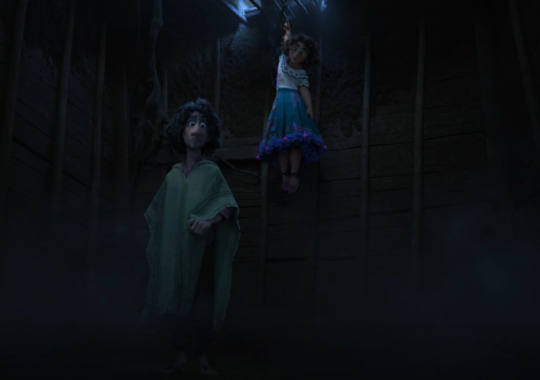
When they are talking about the cracks, yeah, that's definitely the first floor, the ceiling is very high. But. The corridor is wider than before?? That's a lot of space.

And then we have his little room. How do they go to there?
Thinking about when Casita is falling, there is a corridor in the right side of the house, right? The exterior wall is not exactly like the video they showed us, but Mirabel looks there. He was under his tower, in the first floor.
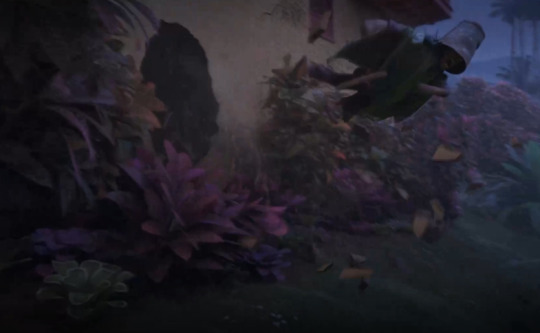
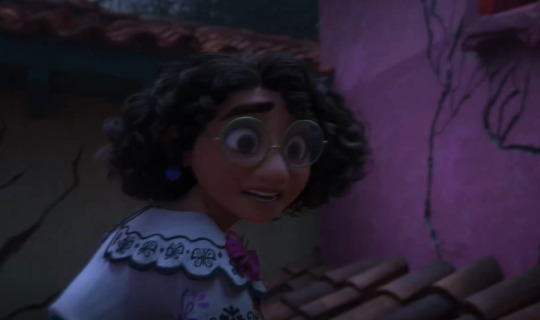
And I thought that maybe that the path to his little room, but the kitchen is in between the two places. And we saw that the windows, the door, everything can be opened. And to his left is the front door, he can't have a corridor there.
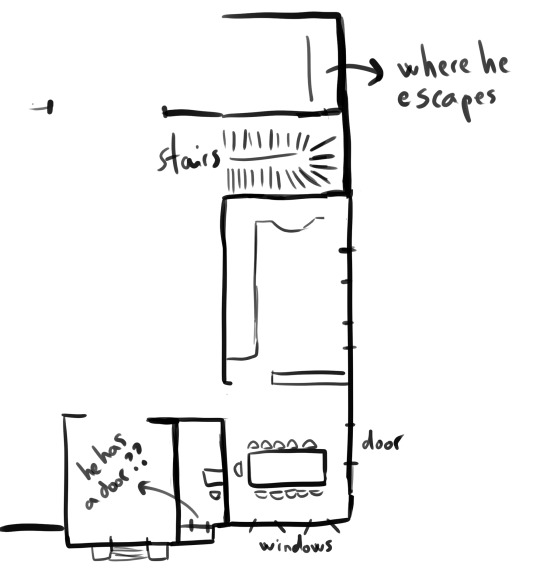
"Maybe he has stairs outside his room, in the little space there" I thought. But in the second floor there is a balcony there.
How. Please, animators explain!!!!
#encanto#encanto disney#encanto meta#i guess?#bruno madrigal#casita#I never know what to write for the tags#my thoughts
27 notes
·
View notes
Note
Your last ask got me thinking; Julieta heals with food, she sees love as food, what if there's certain illnesess that you can't cure with food (as in, the patient can't eat/consume anything due to the illness.) GERD is one, I've had it and you have to be very careful on what you eat/drink during an attack and it becames a chore. And a pain.
Thoughts on how Julieta will handle this? Sorry if this seems random >< 💕
Well, since we don't have an exact manual of how the Madrigals' powers work, we can only make assumptions. I immediately wanted to write a reply because I had an idea for a solution to your problem but I had to do a great deal of thinking and exploring first. (My exact answer is at the bottom if you want to skip the messy meta I made.)
"Julieta heals with food"
"She can heal you with a meal."
This seems obvious at first but we can get way into what even counts as "healing".
Here are some broad 'ailments' I can think of:
Tissue damage and broken bones
Julieta mends a cut on Mirabel's hand with an arepa. She gives a buñuelo to a man with a black eye. She stuffs another one into a guy's mouth and heals his broken arm ("I can't heal what's broken.").
But there's also a dude waiting in line who looks like a grim survivor of a cactus pit. We can assume that he got some moderate tissue damage from it. The pricks have to be manually removed if the skin is to be healed, otherwise, the wounds would close up around them and he'd risk infection.
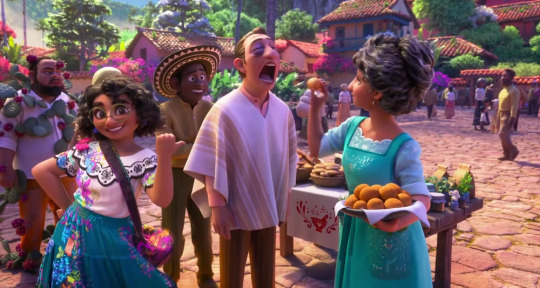
Infections
Now, I'm no doctor, but we can speculate that Julieta's magic can also heal viral infections, if indirect. Going by the first point, damaged cells can be repaired and, as such, boost one's immune system because the body can redirect its energy towards it.
Headaches
Headaches are often only symptoms of an underlying cause and that's why I think it's not guaranteed that Julieta's abilities can get rid of them. For example, I live by the headcanon that Julieta's magic doesn't work against Bruno's vision-induced suffering because it isn't something that's explicitly "breaking" him (or is it?).
Now we get into what even counts as "food".
Here's a definition: "Any nutritious substance that people or animals eat or drink or that plants absorb in order to maintain life and growth."
This also includes soups, of course. But what about tea? How watered-down does food have to be to stop being food? Or does water in itself also count somehow, depending on its nutritional value?
We can see that Julieta knows how to handle different types of herbs and oils. It doesn't seem far off that she mixes her own tinctures, considering that she immediately makes a grab for them when she thought Mirabel got hurt during the collapse of their home (featured in the very dark picture on the left).

What also stands out to me is the mortar on her apron. To me, it implies that Julieta has to process the food first before it gains magical abilities.

But to what degree does it have to be processed? Would a raw potato suddenly mend broken fingers as long as it was cut by Julieta?
I have a theory:
Her love and the effort she puts into making food depend on each other.
The greater her love for the person the less processed the food has to be to heal them.

Maybe that's why she cooks so many different meals for the villagers who are basically strangers to her. (Besides the fact that she wants to indulge everyone with the variety of foods she has to offer.)
Making food is also a more common chore to hone her expertise, and that's why she relies more on that than on elevating her tea-making skills, for example. It also seems like the effectiveness of the food is raised if she feeds it directly to the "injured" person.
But no matter if the "processed food" thing is true or not, one fact remains:
The food has to be ingested to work.
And I finally get to your ask!
The human body can absorb nutrients through its skin so I'd say that for GERD specifically, Julieta would put some homemade oils on your arms and legs to bypass your digestive system. If the case isn't as severe, however, I can imagine that she would rely on herbal teas like chamomile tea (she even stores chamomile plants in her apron pockets!)
#asks#sorry for the mess ahaha#made this on a whim ^^'#encanto#encanto meta#my meta#julieta madrigal#madrigal family#encanto julieta#bruno madrigal#encanto bruno#mirabel madrigal#encanto mirabel#encanto headcanons
99 notes
·
View notes